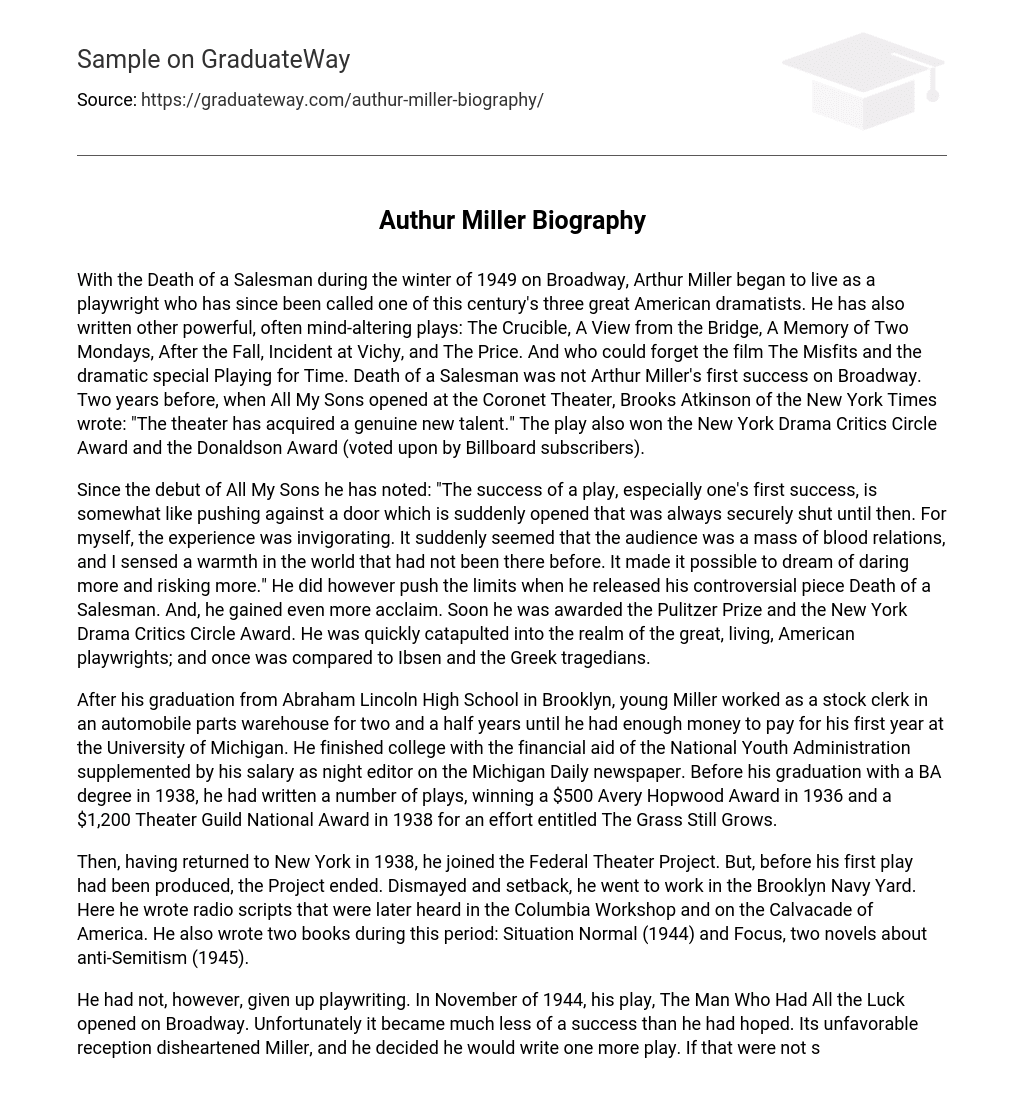Arthur Miller, a renowned American playwright, gained fame in 1949 when his play Death of a Salesman premiered on Broadway. This production solidified his position as one of the greatest dramatists of the century. In addition to this work, Miller has written several other influential plays including The Crucible, A View from the Bridge, A Memory of Two Mondays, After the Fall, Incident at Vichy, and The Price. Furthermore, he made significant contributions to film with The Misfits and to television with the special Playing for Time.
Prior to Death of a Salesman’s success, Miller achieved recognition on Broadway with his play All My Sons at the Coronet Theater. His talent was highly praised by Brooks Atkinson of the New York Times and All My Sons went on to win both the New York Drama Critics Circle Award and the Donaldson Award (selected by Billboard subscribers).
The premiere of All My Sons was a transformative experience for him. He compared achieving success in a play, especially one’s first, to forcefully pushing open a securely locked door that suddenly swings open. Personally, he found this exhilarating and felt an immediate connection with the audience, as if they were his own family. This newfound warmth in the world fueled his energy and made him believe he could take more daring risks and dream even bigger. His controversial masterpiece Death of a Salesman pushed boundaries and further increased his fame. Eventually, he received prestigious accolades like the Pulitzer Prize and the New York Drama Critics Circle Award, solidifying his position as one of America’s greatest living playwrights. In fact, critics drew comparisons between him and esteemed figures such as Ibsen and the Greek tragedians.
Young Miller, who graduated from Abraham Lincoln High School in Brooklyn, spent two and a half years working as a stock clerk in an automobile parts warehouse. Fortunately, he was able to save enough money from his job to cover the expenses of his first year at the University of Michigan. During his time at college, Miller received financial aid from the National Youth Administration and also worked as a night editor for the Michigan Daily newspaper. Alongside his studies, Miller wrote several plays which earned him recognition and awards. In 1936, he won a $500 Avery Hopwood Award and in 1938 he received a $1,200 Theater Guild National Award for his play entitled The Grass Still Grows.
After returning to New York in 1938, he joined the Federal Theater Project. However, the Project ended before his first play could be produced. Feeling disappointed and setback, he started working at the Brooklyn Navy Yard. During this time, he wrote radio scripts that were later featured on the Columbia Workshop and the Calvacade of America. Additionally, he authored two books: Situation Normal (1944) and Focus, two novels addressing anti-Semitism (1945).
Despite facing disappointment with his play, The Man Who Had All the Luck, in November 1944, Arthur Miller persevered and decided to write one final play. This make-or-break moment came in 1947 when he wrote All My Sons. It marked his first significant accomplishment and established him as a notable American playwright. Building on this triumph, Miller went on to create The Crucible in 1953. This production not only became a Broadway sensation but also earned him a prestigious Tony Award. The Crucible captivated audiences with its gripping portrayal of the Salem witch trials and executions in 1962. Additionally, it served as a powerful commentary on the omnipresent “McCarthy era” of Miller’s time.
The controversial yet praised autobiographical tone of After the Fall in 1964 was followed by A View from the Bridge in 1955, where Miller drew inspiration from his knowledge of the Brooklyn waterfront. Miller further showcased his connection to his native city in The Price, centering around a New York policeman in 1968. Miller’s later works, such as The Creation of the Word and Other Business (1972) and The American Clock (1980), continued to explore various themes. In 1980, Miller achieved recognition as he won four Emmy Awards for the television debut of Playing for Time, a true-life dramatic special recounting the experiences of an all-woman orchestra in a Nazi concentration camp. The show itself was honored with an Emmy for Outstanding Drama Special, while Miller was awarded for Outstanding Writing. Vanessa Redgrave won for Outstanding Actress and Jane Alexander for Outstanding Supporting Actress.
Miller has written two books of reportage, In Russia and Chinese Encounters, in addition to his novels. Both books were accompanied by photographs taken by his wife, Inge Morath, who is a professional photographer. His book Salesman in Beijing is based on his experience directing Death of a Salesman in China. In 1987, Miller published an autobiography called Timebends: A Life, which recounts his childhood in Brooklyn, the political turmoil of the 1950s, and the latter half of the century. Miller continues to write and won the 1995 Oliver award for his most recent play, Broken Glass.





